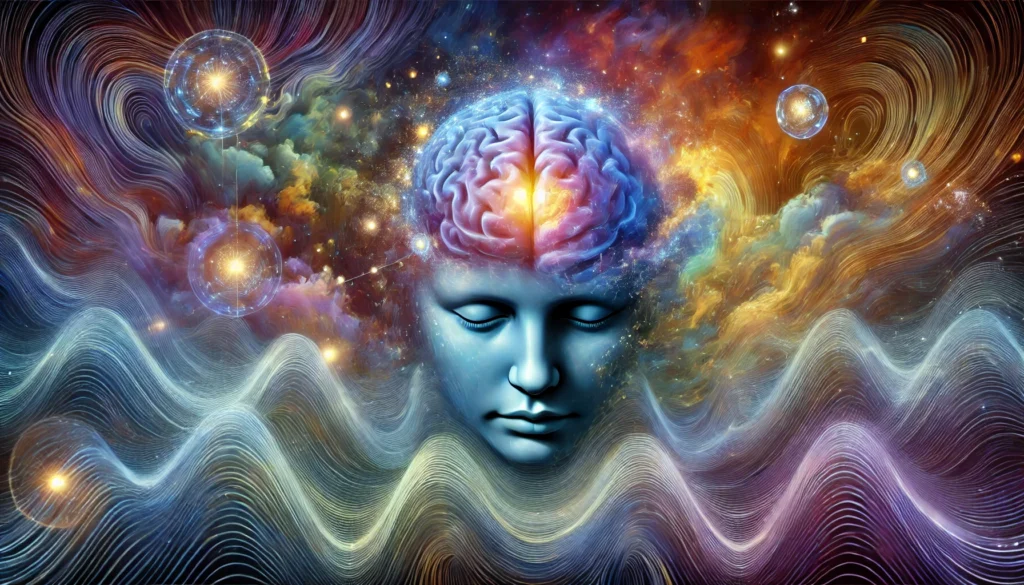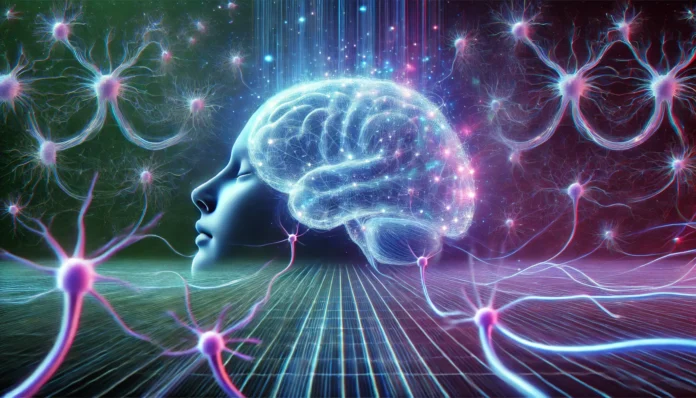Introduction
Sleep is a fundamental component of human health, yet its intricacies are still being uncovered. Among the various stages of sleep, rapid eye movement (REM) sleep plays a particularly crucial role in cognitive function, emotional regulation, and overall well-being. During this stage, unique brain wave patterns emerge, influencing everything from memory consolidation to mood stability. Understanding the function of REM brain waves and their impact on long-term health is essential, especially as researchers uncover links between sleep quality and longevity. This article delves into the intricate relationship between REM brain waves, memory processing, emotional resilience, and lifespan, shedding light on how optimizing sleep can promote cognitive and physical well-being.
You may also like : Best Things for Brain Health: Expert-Backed Strategies to Keep Your Mind Sharp
The Science of Brain Waves During Sleep
Brain activity does not cease when we fall asleep; rather, it undergoes distinct shifts corresponding to different sleep stages. Sleep is divided into non-rapid eye movement (NREM) and REM sleep, with each phase exhibiting specific neural oscillations. Brain waves during sleep fluctuate in frequency and amplitude, with slower delta waves dominating deep sleep and faster, more erratic waves appearing in REM sleep. These oscillations are critical for cellular repair, synaptic pruning, and the formation of long-term memories. The unique pattern of REM brain waves has been linked to increased neuronal plasticity, enabling the brain to encode and integrate complex information efficiently.
One of the distinguishing features of REM sleep is the presence of theta and beta waves, which resemble those observed in wakefulness. This paradoxical state of heightened brain activity, despite muscle atonia, suggests that REM sleep serves an essential role in processing experiences, emotions, and learned behaviors. Understanding these waves provides insight into the intricate processes underlying memory consolidation and emotional stability.
REM Brain Waves and Memory Consolidation
Memory formation is a multi-step process requiring the encoding, storage, and retrieval of information. Sleep brain waves, particularly those seen in REM sleep, play a critical role in transferring memories from short-term storage in the hippocampus to long-term storage in the neocortex. This process, known as memory consolidation, ensures that newly acquired knowledge and experiences are integrated into existing neural networks.
Studies indicate that REM brain waves enhance declarative memory, which involves factual information and explicit learning, as well as procedural memory, which governs skills and habitual actions. The synchronization of theta and gamma oscillations during REM sleep appears to facilitate synaptic strengthening, reinforcing neural pathways associated with learning. Furthermore, individuals who experience disrupted REM sleep often exhibit impairments in memory recall and cognitive flexibility, underscoring the importance of uninterrupted sleep cycles for optimal cognitive performance.
Research on the role of sleep brain waves in memory consolidation has also highlighted their significance in problem-solving and creativity. The brain’s ability to reorganize information during REM sleep enhances pattern recognition and novel idea generation. This phenomenon explains why individuals often experience sudden insights or solutions to problems upon waking from a restful night of sleep. Consequently, prioritizing sleep hygiene to maximize REM sleep may be a simple yet effective strategy for improving cognitive function and intellectual performance.

REM Brain Waves and Emotional Regulation
Beyond memory consolidation, REM sleep plays a pivotal role in emotional processing and mood stabilization. Which type of brain activity is associated with wakeful states differs significantly from that seen in REM sleep, where theta and beta oscillations facilitate emotional regulation. During this stage, the brain reprocesses emotionally charged experiences, diminishing the intensity of negative emotions and reinforcing positive associations.
The amygdala, a key brain structure involved in emotional processing, exhibits heightened activity during REM sleep. This increased activation allows the brain to revisit and contextualize distressing experiences, contributing to emotional resilience. Studies have shown that individuals who experience sufficient REM sleep display greater emotional stability, reduced stress reactivity, and improved mental health outcomes. Conversely, chronic REM sleep deprivation has been linked to mood disorders, including anxiety and depression.
A crucial aspect of REM sleep’s role in emotional well-being lies in its capacity to modulate the stress response. Adequate REM sleep reduces cortisol levels, preventing the detrimental effects of chronic stress on the brain and body. Furthermore, REM sleep fosters adaptive coping mechanisms, enabling individuals to navigate challenges with greater ease. These findings emphasize the importance of sleep brain waves in maintaining psychological balance and overall well-being.
The Connection Between REM Brain Waves and Longevity
The influence of REM sleep extends beyond cognitive and emotional benefits; it also plays a significant role in promoting longevity. Research has identified a strong correlation between sleep quality and lifespan, with individuals who maintain consistent REM sleep patterns exhibiting enhanced cellular repair, reduced inflammation, and improved metabolic function.
One of the key mechanisms through which REM brain waves contribute to longevity is their effect on neuroprotection. During REM sleep, the brain undergoes processes that clear metabolic waste products, including beta-amyloid and tau proteins, which are associated with neurodegenerative diseases such as Alzheimer’s. This clearance process, facilitated by the glymphatic system, underscores the importance of REM sleep in preserving brain health over the lifespan.
Furthermore, REM sleep supports cardiovascular health by regulating blood pressure, heart rate variability, and endothelial function. Individuals with fragmented or insufficient REM sleep often exhibit increased risks of hypertension, stroke, and other cardiovascular conditions. Prioritizing sleep hygiene and addressing sleep disorders can significantly improve longevity by mitigating these risks.
Optimizing REM Sleep for Cognitive and Physical Well-Being
Given the profound impact of REM sleep on memory, mood, and longevity, adopting strategies to enhance REM sleep quality is paramount. Establishing a consistent sleep schedule, reducing screen exposure before bedtime, and creating a sleep-conducive environment can all promote healthy sleep cycles. Additionally, lifestyle factors such as regular physical activity, stress management, and a balanced diet play crucial roles in optimizing REM sleep.
Certain dietary choices have been shown to support REM sleep by influencing neurotransmitter production. Foods rich in tryptophan, such as turkey, dairy, and nuts, can enhance serotonin synthesis, which is a precursor to melatonin—the hormone that regulates sleep. Additionally, avoiding excessive caffeine and alcohol consumption can prevent sleep disturbances and ensure the natural progression of sleep cycles.
For individuals experiencing persistent sleep disruptions, cognitive-behavioral therapy for insomnia (CBT-I) and relaxation techniques, such as mindfulness meditation, can be effective interventions. Addressing underlying medical conditions, such as sleep apnea, is also essential for maintaining optimal REM sleep.

Frequently Asked Questions (FAQ) on REM Brain Waves, Memory, Mood, and Longevity
1. How do REM brain waves influence learning and cognitive performance? REM brain waves are vital for consolidating and organizing new information, allowing for enhanced learning efficiency. During REM sleep, the brain undergoes neural restructuring, reinforcing the pathways required for complex problem-solving and creative thinking. Sleep brain waves associated with REM sleep improve the retention of procedural and declarative memory, ensuring long-term knowledge acquisition. Research suggests that individuals who achieve higher-quality REM sleep demonstrate improved cognitive flexibility and better adaptation to new learning environments. By prioritizing REM sleep, individuals can optimize brain plasticity and enhance their ability to absorb and apply new knowledge effectively.
2. What happens if REM sleep is consistently disrupted?
Chronic disruption of REM sleep can lead to cognitive deficits, emotional instability, and increased risk of neurodegenerative conditions. Without adequate REM sleep, the synchronization of brain waves during sleep is compromised, hindering memory consolidation and emotional processing. Over time, disrupted REM sleep has been linked to heightened anxiety, mood disorders, and impaired decision-making abilities. Furthermore, studies indicate that poor REM sleep quality may accelerate cognitive decline, increasing the likelihood of developing conditions such as Alzheimer’s disease. Addressing sleep disturbances through proper sleep hygiene and medical interventions can mitigate these risks and improve overall well-being.
3. How does REM sleep contribute to emotional resilience?
REM sleep plays a critical role in regulating emotions by processing and integrating experiences from waking life. Sleep brain waves during this phase facilitate the reorganization of emotionally charged memories, reducing stress reactivity and promoting adaptive coping mechanisms. The brain’s limbic system, which governs emotions, remains highly active during REM sleep, allowing for emotional recalibration. Individuals who achieve sufficient REM sleep often exhibit better emotional stability and are more equipped to handle daily stressors. This highlights the importance of prioritizing sleep for maintaining psychological health and emotional resilience.
4. What lifestyle factors can improve REM sleep quality?
Several lifestyle choices directly impact REM sleep quality, including sleep schedule consistency, stress management, and dietary habits. Regular physical activity can enhance sleep brain waves by promoting a natural sleep-wake cycle, while mindfulness techniques such as meditation help reduce cortisol levels that interfere with REM sleep. Avoiding stimulants like caffeine and alcohol before bedtime is crucial, as these substances can suppress REM sleep duration. Additionally, exposure to natural daylight during the day and minimizing blue light exposure before bed can regulate melatonin production, promoting deeper REM sleep. Prioritizing these habits ensures a healthy balance of REM and NREM sleep, optimizing brain function and overall health.
5. How do REM brain waves differ from brain activity during wakefulness? Which type of brain activity is associated with wakeful states primarily involves beta and gamma waves, which facilitate attention, logical reasoning, and active engagement with external stimuli. During REM sleep, however, brain activity shifts to a combination of theta and beta waves, resembling a state of wakefulness while the body remains in a state of atonia. This paradoxical state allows for the integration of subconscious experiences, emotional processing, and memory consolidation. Unlike wakefulness, where external stimuli shape cognitive function, REM sleep enables internalized brain activity that fosters creativity and problem-solving. This unique brain state emphasizes why REM sleep is indispensable for mental clarity and emotional health.
6. Can improving REM sleep contribute to longevity?
Emerging research suggests that optimizing REM sleep may significantly impact longevity by supporting neuroprotection and reducing systemic inflammation. REM brain waves facilitate cellular repair, detoxification, and immune function, processes that are essential for long-term health. Disruptions in REM sleep have been linked to increased risks of cardiovascular disease, metabolic disorders, and neurodegeneration. Additionally, sleep brain waves play a role in regulating hormone balance, including melatonin and growth hormones, both of which influence aging and overall vitality. By fostering consistent and high-quality REM sleep, individuals can enhance lifespan and promote healthy aging.
7. How does REM sleep affect problem-solving abilities?
REM sleep has been closely associated with enhanced problem-solving and creative thinking, thanks to its unique brain wave activity. Sleep brain waves during this stage facilitate non-linear thinking by reorganizing neural connections and forming new associations. Studies have demonstrated that individuals who experience adequate REM sleep outperform sleep-deprived counterparts in tasks requiring innovation and abstract reasoning. This effect is particularly evident in artistic endeavors, scientific discoveries, and strategic decision-making. By ensuring sufficient REM sleep, individuals can maximize their problem-solving potential and enhance cognitive agility.
8. What role does REM sleep play in stress regulation?
REM sleep acts as a natural buffer against chronic stress by modulating the brain’s response to emotional challenges. Which type of brain activity is associated with wakeful states is distinct from that of REM sleep, where brain waves engage in processing and desensitizing stressful experiences. This function helps diminish the emotional charge of distressing memories, reducing the risk of post-traumatic stress disorder (PTSD) and anxiety disorders. Additionally, REM sleep lowers cortisol levels, mitigating the negative impact of prolonged stress on the body and brain. Maintaining regular REM sleep patterns is a crucial strategy for sustaining mental and physical resilience in stressful environments.
9. How does REM sleep impact physical health beyond brain function?
While REM sleep is predominantly recognized for its effects on cognition, it also plays a fundamental role in physical health. Sleep brain waves during REM sleep contribute to muscle repair, metabolic balance, and immune system regulation. The body undergoes critical physiological restoration during REM sleep, aiding in tissue growth, energy conservation, and hormone stabilization. Furthermore, REM sleep has been shown to influence glucose metabolism, reducing the risk of insulin resistance and type 2 diabetes. This underscores the necessity of REM sleep not only for mental acuity but also for sustaining overall bodily health.
10. Can certain foods enhance REM sleep?
Dietary choices can significantly impact the quality and duration of REM sleep, as certain nutrients influence neurotransmitter production. Foods rich in tryptophan, such as turkey, eggs, and nuts, promote serotonin synthesis, which is a precursor to melatonin, the hormone regulating sleep cycles. Magnesium-rich foods like leafy greens and seeds help regulate neurotransmitter function, improving sleep brain waves associated with deep and restorative sleep. Additionally, omega-3 fatty acids found in fish and flaxseeds enhance brain plasticity, potentially improving REM sleep efficiency. Avoiding excessive sugar, caffeine, and alcohol intake can further optimize sleep architecture and maintain a healthy balance of REM sleep cycles. Prioritizing these dietary strategies can enhance both cognitive and physical benefits associated with REM sleep.

Conclusion
The intricate relationship between REM brain waves, memory, mood, and longevity underscores the critical role of sleep in overall health. By facilitating memory consolidation, emotional regulation, and cellular repair, REM sleep enhances cognitive function, psychological resilience, and lifespan. Understanding which type of brain activity is associated with wakeful states versus REM sleep further highlights the unique and essential functions of this sleep stage. Prioritizing sleep hygiene and adopting evidence-based strategies to optimize REM sleep can yield significant benefits for long-term well-being. As research continues to unveil the mechanisms underlying sleep brain waves, it becomes increasingly clear that quality sleep is not just a luxury but a necessity for a thriving, healthy life.
sleep cycle optimization, deep sleep benefits, cognitive function and sleep, emotional stability through sleep, brain activity during rest, theta waves and cognition, beta waves in dreaming, sleep and neural plasticity, longevity and sleep quality, REM sleep and stress reduction, neuroprotection through sleep, memory retention and sleep, sleep architecture and aging, sleep deprivation effects, brain detoxification during sleep, sleep and mental health, circadian rhythms and cognitive health, improving sleep hygiene, sleep disorders and brain health, restful sleep strategies
Further Reading:
Sleep-stage dependent patterning of slowly propagating brain activity
Alpha Waves and Sleep: Their Role in Relaxation
Disclaimer
The information contained in this article is provided for general informational purposes only and is not intended to serve as medical, legal, or professional advice. While Health11News strives to present accurate, up-to-date, and reliable content, no warranty or guarantee, expressed or implied, is made regarding the completeness, accuracy, or adequacy of the information provided. Readers are strongly advised to seek the guidance of a qualified healthcare provider or other relevant professionals before acting on any information contained in this article. Health11News, its authors, editors, and contributors expressly disclaim any liability for any damages, losses, or consequences arising directly or indirectly from the use, interpretation, or reliance on any information presented herein. The views and opinions expressed in this article are those of the author(s) and do not necessarily reflect the official policies or positions of Health11News.


